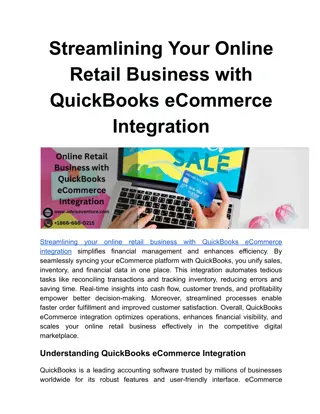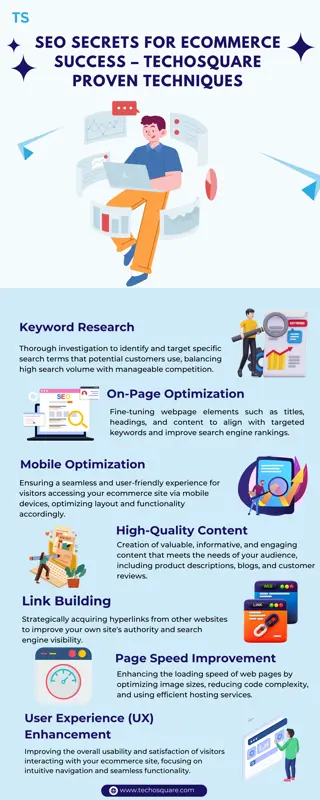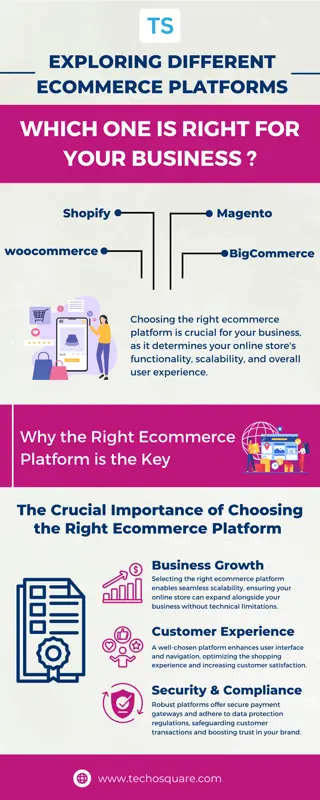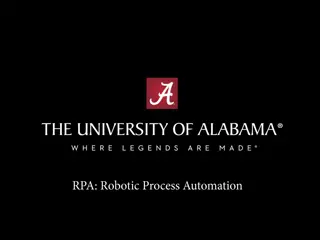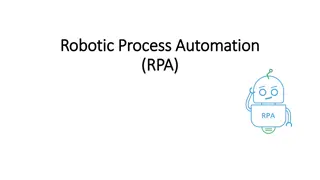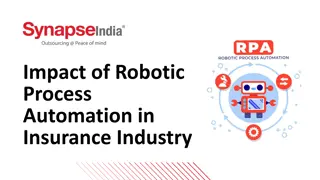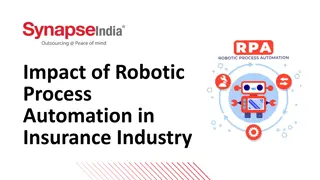Future-proof Your Ecommerce Business with RPA
Stay ahead in the dynamic ecommerce market with our advanced RPA solutions. Integrate AI and machine learning for smarter automation, and utilize predictive analytics for better decision-making. Our innovative RPA services ensure continuous improveme
Uploaded on Aug 06, 2024 | 1 Views
Download Presentation

Please find below an Image/Link to download the presentation.
The content on the website is provided AS IS for your information and personal use only. It may not be sold, licensed, or shared on other websites without obtaining consent from the author.If you encounter any issues during the download, it is possible that the publisher has removed the file from their server.
You are allowed to download the files provided on this website for personal or commercial use, subject to the condition that they are used lawfully. All files are the property of their respective owners.
The content on the website is provided AS IS for your information and personal use only. It may not be sold, licensed, or shared on other websites without obtaining consent from the author.
E N D
Presentation Transcript
How RPA Helps Retail and E- Commerce Industry
Table of Content 01 Introduction 02 Enhancing Customer Experience Streamlining Inventory Management 03 Optimizing Order Processing 04 Improving Sales and Marketing Efforts 05 Boosting Operational Efficiency 06 Future Trends and Conclusion 07
Introduction to RPA in Retail and E-Commerce Definition of Robotic Process Automation (RPA): Software technology that automates repetitive tasks. Mimics human interactions with digital systems. Importance of Automation: Enhances efficiency and accuracy. Reduces operational costs. Key Benefits: Faster processes, reduced errors. Improved customer satisfaction. Used inRPA in Ecommerce Industry
Enhancing Customer Experience Automated Customer Support: 24/7 chatbots handling inquiries. Instant responses to common questions. Personalized Marketing: Automated recommendations based on customer data. Tailored promotions and offers. Faster Response Times: Immediate order confirmations. Real-time status updates. Improved Order Processing: Accuracy in handling orders. Reduced errors in data entry.
Streamlining Inventory Management Real-time Inventory Tracking: Continuous monitoring of stock levels. Immediate updates across systems. Automated Stock Replenishment: Alerts for low stock levels. Automatic reorder placements. Reduced Human Errors: Accurate inventory records. Consistent data management. Enhanced Supply Chain Visibility: Better coordination with suppliers. Real-time tracking of goods.
Optimizing Order Processing Faster Order Fulfillment: Quick processing and dispatch. Streamlined order workflows. Automated Payment Processing: Efficient handling of transactions. Secure and error-free invoicing. Improved Order Data Accuracy: Elimination of manual entry mistakes. Consistent order information. Reduced Manual Intervention: Seamless process automation. Minimized delays in order handling.
Improving Sales and Marketing Efforts Automated Email Campaigns: Scheduled and personalized emails. Targeted promotional messages. Data-driven Insights: Analysis of customer behavior. Informed decision-making for promotions. Enhanced Customer Segmentation: Precise targeting of different groups. Better engagement and conversion. Streamlined Product Updates: Automated listing management. Real-time product information.
Boosting Operational Efficiency Reduced Operational Costs: Savings from automated processes. Less reliance on manual labor. Streamlined Back-office Processes: Automation of administrative tasks. Efficient handling of routine work. Enhanced Compliance: Automated audit trails. Improved regulatory adherence. Scalability: Easily handles peak periods. Scales with business growth.
Future Trends and Conclusion Emerging Trends: AI and machine learning integration with RPA. Increasing use of predictive analytics. Potential for Innovation: Development of smarter automation tools. Enhanced customer engagement techniques. Summary of Benefits: Increased efficiency, reduced costs. Improved customer satisfaction. Adoption Encouragement: Gain competitive advantage. Stay ahead in the dynamic mark
Contact Us www.synapseindia.com info@synapseindia.com +18557962773








